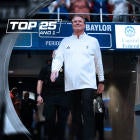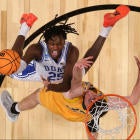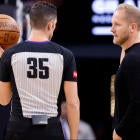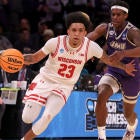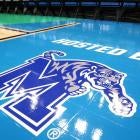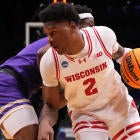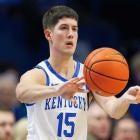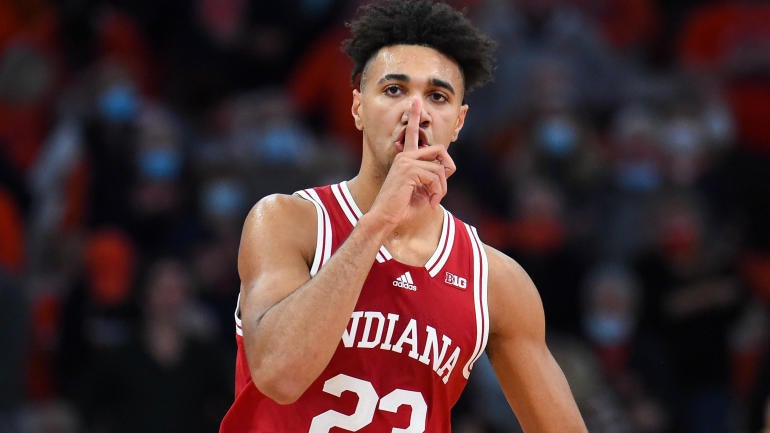
The frustration of trying to identify the No. 12 vs. No. 5 upset you want to pick as you fill out your bracket is a tale as old as time. Well, it's a tale as old as 1985, at least.
The No. 9 vs. No. 8 game is essentially a toss-up. There's a significant drop-off in winning percentage from No. 9 seeds to No. 10 seeds, but then just a small one from No. 10 to No. 11 and No. 11 to No. 12 before another steep drop-off for No. 13 seeds. In essence, history says your best last chance for a big upset usually lies with the No. 12 seeds.
Time is running out for Brackets! Fill out your brackets in your pools and enter for a chance to win a trip to the 2023 Men's Final FourⓇ.
At least one No. 12 seed has defeated a No. 5 seed in 32 of the 36 tournaments since expansion. Five of the last nine tournaments have featured multiple No. 12 vs. No. 5 upsets, including three in both 2019 and 2014.
Since the tournament expanded to 64 teams in 1985, here is the record of seed underdogs in the first round.
Seed-vs-seed | Win-Loss | Win pct |
No. 9 vs 8 | 73-71 | .507 |
No. 10 vs 7 | 57-86 | .399 |
No. 11 vs 6 | 54-90 | .375 |
No. 12 vs 5 | 51-93 | .354 |
No. 13 vs 4 | 31-113 | .215 |
No. 14 vs 3 | 22-122 | .153 |
No. 15 vs 2 | 9-135 | .063 |
No. 16 vs 1 | 1-143 | .007 |
One clue we can use is team conference: Since 1996-97 -- the Big 12's inaugural season -- we've had six "major" conferences: ACC, Big 12, Big East, Big Ten, Pac-12 and SEC. Here's how No. 12 seeds have fared based on conference affiliation since:
No. 12 SEED vs No. 5 SEED SINCE 1997 | No. 5 seed from major conf. | No. 5 seed not from major conf. |
No. 12 seed from major conf. | 8-4 (.666) | 4-1 (.800) |
No. 12 seed not from major conf. | 18-45 (.286) | 7-9 (.438) |
With those considerable differences in mind, let's take a look at which team is most likely to pull off the famed 12-5 upset.
1. Indiana
First round opponent: Saint Mary's
The Hoosiers entered the NCAA Tournament as the highest-ranked No. 12 seed by both the NET (38th) and KenPom.com (36th), and defense is a big reason why, as shown in Tuesday's First Four win over Wyoming. The Cowboys committed a season-high 19 turnovers -- 10 by star point guard Hunter Maldonado -- and had multiple five-minute stretches in which they did not make a field goal.
Indiana's offense wasn't much better, but it does have a relatively stable floor thanks to star big man Trayce Jackson-Davis, who posted 29 points in his NCAA Tournament debut. While second- and third-leading scorers Xavier Johnson and Race Thompson combined for just 14 points on 5-of-21 shooting, Jackson-Davis ensured things wouldn't completely fall apart. This came just days after he averaged 25.3 points per game in the Big Ten Tournament.
Like Indiana, Saint Mary's is extremely good defensively. The Gaels rank ninth in defensive efficiency this season, even better than the Hoosiers, who come in at 21st. Both teams are in the top 20 in field goal defense at the rim, and both are happy to play at a slow pace. Don't expect a ton of points here.
As I wrote Monday regarding First Four teams that could make a run, Indiana has the pieces in place. It will need better guard play, especially from Johnson. But throw in the trends from the chart above and the fact that in a low-scoring, low-possession game, the difference could be simply having the best player (in this game, Jackson-Davis) on the floor, and Indiana is a strong option.
2. UAB
First round opponent: Houston
America, prepare to meet Jordan "Jelly" Walker. The electric junior guard spent time at Seton Hall and Tulane but found a home at UAB this year, leading the league in both points (21.6) and assists (5.3) per game in conference play en route to earning Conference USA Player of the Year honors. Walker was the only Division I player this season to score 20 points per game, make 100 3-pointers and shoot 40% from deep. Last year, the only player to do that was Oral Roberts' Max Abmas, whose Golden Eagles made the Sweet 16 as a No. 15 seed.
Elsewhere, Quan Jackson is one of the nation's best steal artists, and KJ Buffen is the type of rugged forward you need in order to beat a team like Houston, which is the definition of "rugged." Coach Andy Kennedy took Ole Miss to the NCAA Tournament twice -- as a No. 12 seed in 2013 and as a No. 11 seed in 2015 -- and both times, the Rebels won a game.
Expect this one to be decided in two areas. First, the Blazers shoot 38% from deep, 20th in Division I, but the Cougars allow just a 29% clip from there, good for 11th. Second, UAB was a solid defensive rebounding team but will have to take it up a notch: Houston rebounds nearly 38% of its misses, third in Division I.
3. New Mexico State
First round opponent: UConn
New Mexico State finished an impressive 26-6 and won the WAC Tournament, beating Grand Canyon and Abilene Christian by a combined 19 points. This is the Aggies' ninth trip to the NCAA Tournament since 2010. The bad news? They're 0-8 in their previous eight trips, and haven't won a Tournament game since 1993.
The biggest reason to believe the drought ends this year is Teddy Allen, who is at his fifth different college in five years -- West Virginia in 2017-18, Wichita State (sat out as transfer) in 2018-19, Western Nebraska Community College in 2019-20 after getting kicked off Wichita State, Nebraska in 2020-21 and New Mexico State this year. No matter the setting, Allen's always been able to score. His 19.3 points per game led the WAC this season.
This particular matchup, though, is a tough one. The Huskies have several long, athletic wing defenders to use against Allen, and behind them is a strong rim protector in Adama Sanogo. On the other end, UConn owns the nation's second-best offensive rebounding percentage. New Mexico State, on the other hand, ranks outside the top 100 in defensive rebounding percentage. The Aggies don't shoot it well from the perimeter or the foul line either, two factors that hurt their chances of pulling off the upset.
4. Richmond
First round opponent: Iowa
Coming off a surprising run to the Atlantic 10 Tournament title, Richmond may have come in higher if its opponent wasn't coming off an even more impressive conference tournament performance. Iowa's Big Ten Tournament title was one of the most impressive displays during conference tournament play.
All hope is not lost for the Spiders. Jacob Gilyard is the all-time NCAA leader in steals and is coming off an electric performance in the A-10 Tournament. Sixth-year senior Grant Golden is a skilled big man who often runs the offense, and Tyler Burton is a terrific defender with the length and quickness to potentially bother First-Team All-American Keegan Murray.
The Hawkeyes just have too much firepower on offense (second in offensive efficiency compared to Richmond's 69th), are too composed (third in turnover rate) and are simply too dynamic for the Spiders. Murray is a matchup nightmare, and when he plays alongside his brother, Kris, Iowa's offense is nearly unguardable. If the Spiders try to downsize by taking out Golden, their offense may not be able to keep up. If they keep Golden in, significant defensive issues may emerge. Coach Chris Mooney will have his hands full with that issue and much more.













